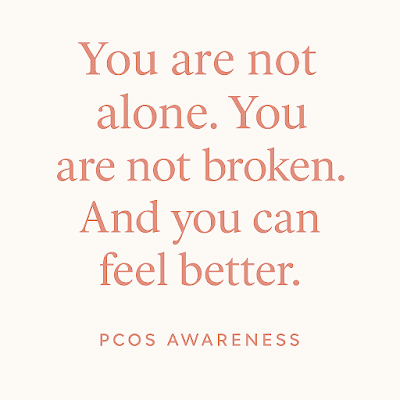My PCOS Journey – From Pain to Empowerment
By Joanna Vidal
Hello, dearest readers!
It’s me again—Joanna. For those of you who are new here, welcome! I love sharing my experiences to inspire and motivate others, and today’s topic is something deeply personal: Polycystic Ovary Syndrome, also known as PCOS or Stein–Leventhal syndrome.
This condition is a hormonal imbalance that affects millions of women around the world. While it’s not deadly, if left untreated, it can lead to serious health complications like diabetes, infertility, and even certain cancers. Sadly, many women go undiagnosed due to lack of awareness, misinformation, or misdiagnosis. That’s why I’m here—sharing my journey to help others recognize the signs, feel less alone, and take action.
How It All Began: My Early Symptoms
I started experiencing symptoms of PCOS when I was just 14 years old. My period became irregular and extremely painful. Each time it came, I felt dizzy, pale, and weak. There was even a day when I fainted due to the dizziness.
My mom took me to a gynecologist, but the doctor brushed it off as something that would “go away once I got married and had children.” I didn’t understand why she said that—and that comment stayed with me for years.
In college, things got worse. During a bowling class, I felt dizzy again and fainted in a public place. It was embarrassing and scary. The clinic doctor said I was anemic and gave me chocolate for low blood sugar. This confused me even more because I had no clear diagnosis. My period continued to be irregular until I turned 25.
Searching for Answers
Years later, while working abroad, the pain during my periods became unbearable. I finally decided to see a General Practitioner who referred me to a gynecologist. After several tests—blood work, ultrasounds, and X-rays—I found out that I had multiple cysts on my ovaries.
I was shocked and terrified.
The doctor who read the X-ray didn’t explain much. I had to wait an entire day to get the full results. That night was one of the hardest nights of my life. I was alone in a foreign country, crying all night, unable to sleep. I didn’t even tell my family because I didn’t want them to worry.
When I returned to the doctor, she mentioned PCOS and suggested insulin injections. I panicked. She didn’t explain what PCOS meant. When I asked questions, her only response was, “Google it.” I left the clinic more confused and afraid than ever.
Luckily, I called my brother, who is a registered nurse. He told me that insulin is usually given to people with high blood sugar (diabetes)—but I was told in college that I had low blood sugar. His advice: find another doctor.
Finding the Right Help
I researched hospitals that specialized in OB-Gynecology and chose a doctor with great reviews. This was one of the best decisions I ever made.
She re-did all my tests on the same day and gave me a clear, kind, and thorough explanation. She even connected my past struggles with acne to PCOS (read my blog: My Acne Story – How I Got Rid of It). I finally felt heard and understood.
She prescribed oral medicine and recommended lifestyle changes, especially around diet and exercise. She explained that if I followed her advice, I would see improvement within three months. She also encouraged me to walk daily—at least one hour of brisk walking every day—to help regulate my cycle and reduce pain.
What You Should Ask Your Doctor
If you suspect PCOS, the most important question to ask is:
“What is PCOS and how can I manage it?”
If your doctor cannot clearly explain your condition or make you feel safe and informed, it’s time to find a new one. A supportive doctor can make a huge difference in your healing journey.
What Is PCOS?
PCOS is a hormonal condition where a woman’s body produces abnormal levels of androgens (male hormones), which can interfere with ovulation, menstrual cycles, and fertility.
Hormones are like messengers that control everything—from fat distribution and ovulation to mood swings and cravings. With PCOS, this system is out of balance. It affects both how we feel emotionally and how our body functions physically.
How Is PCOS Diagnosed?
Diagnosis usually involves:
• Reviewing your medical history
• A physical examination (checking for acne, hair growth, body weight, etc.)
• Ultrasound (to look for cysts in your ovaries)
• Blood tests (to check hormone levels: testosterone, insulin, LH, FSH, estrogen)
Note: You don’t have to have visible cysts to be diagnosed with PCOS.
Common Symptoms of PCOS
• Irregular or painful periods
• Weight gain or difficulty losing weight
• Cystic acne
• Excess facial/body hair
• Ovarian cysts
• Mood swings, depression, anxiety
• High testosterone levels
• Metabolic issues
High-Risk Factors
• Insulin resistance
• Type 2 diabetes
• Infertility
• Cardiovascular issues
• Endometrial cancer
Managing PCOS: What Helped Me
Here’s what worked for me and might work for you:
• Exercise: I followed a routine of 5 days of brisk walking (2 hours) with cardio, and 2 days of lighter activity.
• Diet: I follow an Australian-style PCOS-friendly diet—high in fiber, low in sugar and processed foods.
• Discipline: I track my food, symptoms, and emotions to stay accountable.
• Medication: Take what’s prescribed and ask about supplements that can support hormonal balance.
• Mental health: Acknowledge that it’s hard. But also, know that you’re stronger than your struggles.
To every woman reading this:
You are not alone. You are not broken. And you CAN feel better.
It takes time, patience, and self-love—but it’s possible. I hope my story helped even just one person feel a little lighter and a little more hopeful today.
Please feel free to share this post to help spread awareness. PCOS needs more voices, more stories, and more kindness.
With love,
Joanna
Let’s raise awareness, break the stigma, and heal together.
Follow me on:
Insta: @unjoannable_m3






Comments